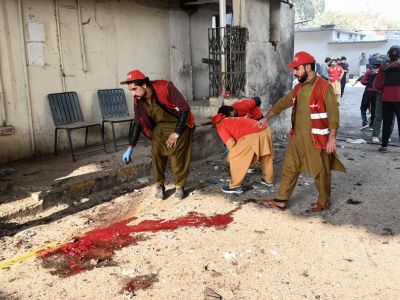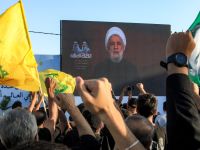A car bomb went off Monday near the Lebanese judiciary's central Beirut headquarters, which is hosting the trials of anti-Syrian Christian activists, but there were no injuries, police told AFP.
The blast appeared to have been caused by an explosive charge placed under a car parked on a main avenue near the court center, they said.
Police closed off the area of the explosion, which seemed to be small, and the car was only partly damaged, an AFP photographer said.
There is still no information about the motives of the explosion and an investigation has been launched, police said.
The judiciary headquarters is the site of trials of dozens of anti-Syrian Christians arrested in a recent army crackdown.
Army intelligence carried out a major round-up without government approval on August 5-8, arresting more than 200 anti-Syrian Christians and provoking a storm of protest in opposition ranks.
Some of those arrested have been charged with links to Israel.
Meanwile, the Daily Star reported Monday that two MPs and a prominent party leader faced questioning on charges related to the recent wave of arrests, citing an unnamed senior judicial source, who declined to identify the politicians.
The source would not rule out the arrest of more journalists, saying "this depends on the results of investigations."
Two journalists have been arrested so far: Antoine Bassil, a correspondent for the Saudi-owned Middle East Broadcasting Corporation; and Habib Younes, managing editor of the Beirut edition of the London-based Al Hayat newspaper, who was arrested at his home in Jbeil Saturday night.
As Safir Arabic daily cited security sources as saying that Younes had confessed to having links with the Jewsish state.
The source told the Star that the judiciary was not concerned with whether the detention of party leaders and MPs would "shock" public opinion."
"We don't talk of shocks," the source said. "The law will run its course and will be implemented against all perpetrators, no matter how influential."
Meanwhile, judicial sources speaking on condition of anonymity accused Bassil of playing a key role in links with Israelis and added that he was sending coded messages from his home in Ballouneh. Reportedly, "a computer, videotapes, Israeli maps, coded messages and books in Hebrew" were confiscated from his home.
Bassil is alleged to have "close ties" with Tawfiq Hindi (political adviser to jailed Samir Geagea, leader of the disbanded Lebanese Forces ) who has allegedly held several meetings with Uri Lubrani, the former coordinator for Israeli activities in Lebanon.
Judicial sources said Hindi's most recent encounter with Lubrani allegedly took place in Paris two months ago when the two discussed ways to revive the Lebanese Forces (LF) and strengthen partisans so they could carry out anti-Syrian activities.
According to the sources, it was Hindi "who initiated contacts with the Israelis and not vice versa," and he has maintained contacts with Israel "since the time Geagea led the LF."
Hindi has been accused of visiting the Jewish state as well.
Citing the National News Agency, the paper said that Bassil revealed in his confessions that the "disbanded Lebanese Forces chose to collaborate with the Jewish state after fears that former senior LF official Fouad Malek, who showed signs of taking a pro-government stance, would take control of the disbanded militia."
Bassil was an LF member and previously worked for Middle East TV, run by the disbanded South Lebanon Army.
Hindi is expected to be officially charged Monday by Military Prosecutor Nasri Lahoud on charges of "collaborating with the Israeli enemy and providing it with information on internal ... affairs and activities."
A similar charge is expected to be leveled against Bassil. The fate of Salman Samaha, the LF student coordinator and lawyer Elie Keyrouz, also an LF member, remains unclear. However, official arrest warrants will also be issued against them, according to the daily.
Meanwhile, the daily said in a separate story Monday that attempts to calm the political tension would pick up this week when President Emile Lahoud held separate encounters with the Maronite patriarch and Walid Jumblatt, the head of the Progressive Socialist Party.
Jumblatt is also due to meet with Syrian President Bashar Al Assad in Damascus.
On Tuesday, Lahoud is expected to visit Diman, the summer residence of Cardinal Nasrallah Butros Sfeir, and to host Jumblatt for lunch at Baabda Palace two days later.
A Baabda Palace source was quoted as saying that the meetings would provide an opportunity for Lahoud to "evaluate" the events of recent weeks, which saw the round-ups, “against the convictions of MPs and ministers, as well as of Premier Rafiq Hariri,” said the daily – Albawaba.com
© 2001 Al Bawaba (www.albawaba.com)









